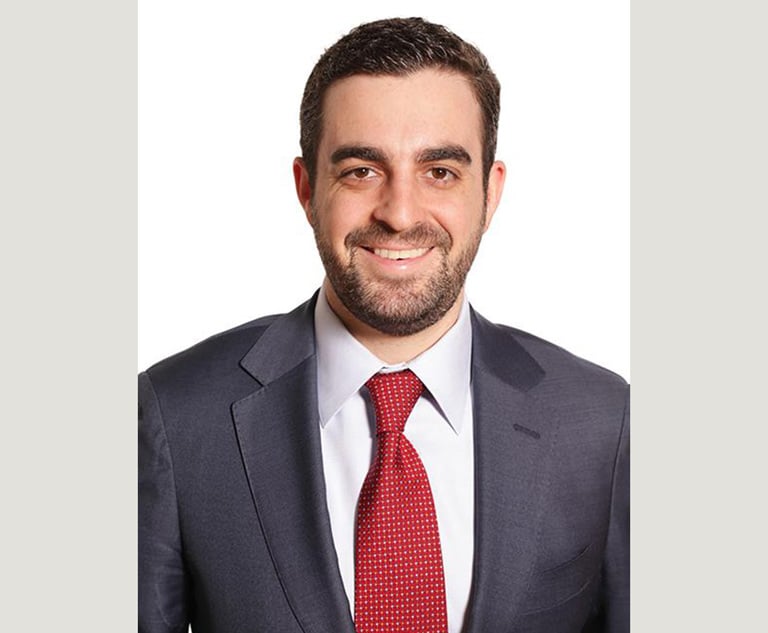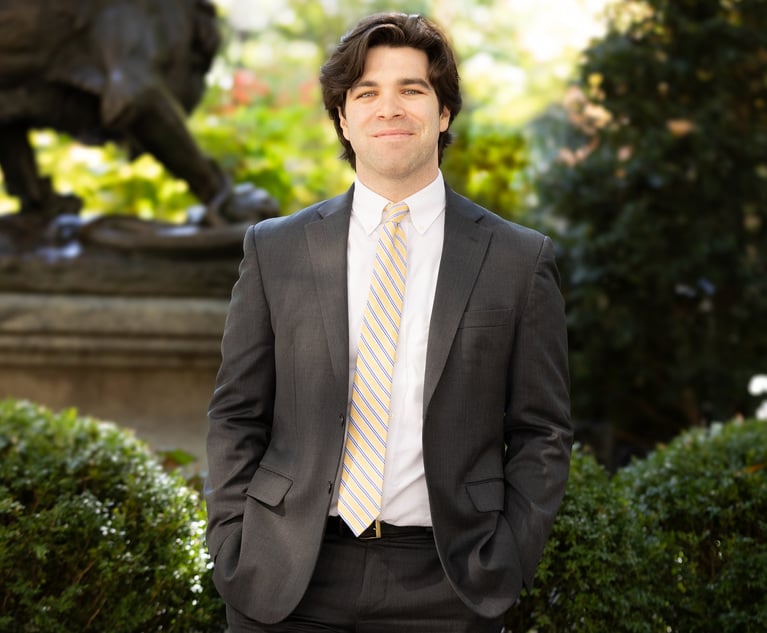 Griswold Home Care's Connecticut headquarters in Stratford. Photo: Google
Griswold Home Care's Connecticut headquarters in Stratford. Photo: GooglePhiladelphia-Based Griswold Home Care Hit With FLSA Suit in Connecticut
Former Griswold home health aide Ionie Scott filed a federal lawsuit seeking collective and class action certification.
April 12, 2019 at 01:42 PM
3 minute read
The original version of this story was published on Connecticut Law Tribune
A prospective collective and class action lawsuit has been filed against the country's oldest nonmedical home care franchiser, alleging its Connecticut branch failed to pay overtime and unlawfully deducted wages from approximately 400 home health aides.
The lawsuit, filed Tuesday in the U.S. District Court for the District of Connecticut, alleges Griswold Home Care, which is headquartered in Pennsylvania but has franchises throughout the country, including Connecticut, violated the federal Fair Labor Standards Act and the Connecticut General Statutes. It names as defendants Cathy Howard and her daughter, Maria Malafronte, who own several Griswold franchises in Connecticut.
Howard and Malafronte did not respond to messages left Friday at their Stratford office. And Griwsold, which is headquartered in Plymouth Meeting, Pennsylvania, had not assigned an attorney to represent it in the Connecticut suit as of Friday. The company also doesn't have a legal department. Its compliance manager, Cathy Reilly, said any comment would have to come from Matthew Murphy, Griswold's president and chief executive officer, who did not respond to a request for comment by press time.
The lawsuit was filed on behalf of Bridgeport resident Ionie Scott, who was employed as a home health aide from February 2017 through October 2018. In that role, the lawsuit says, Scott would provide home health care services, such as bathing and grooming, to elderly and disabled patients in Fairfield County.
The lawsuit said Scott was paid $158 for each 24-hour shift and would be paid an hourly rate for those assignments that were not part of a 24-hour shift. The lawsuit contends that Scott and other health care aides in Connecticut would regularly work in excess of 40 hours weekly.
“Defendants failed and refused to pay any overtime to any of the home health care aides employed by them,” the lawsuit states.
The complaint also alleges Griswold never provided any information, either written or verbally, regarding Scott's eligibility for overtime pay. It claims the company violated FLSA guidelines by failing to post that information in a common area that employees could access. In doing so, the lawsuit claims, the company attempted “to conceal its employees' rights and discourage them from taking steps to enforce the law as its applies to their circumstances.”
The lawsuit also states Griswold promised Scott and others at least $10 a day for meals, but never reimbursed them.
The collective action covers home health aides who worked for Griswold from April 9, 2016, to the present, while the class action covers home health aides who worked for the defendant since April 7, 2011.
Collective and class actions share some characteristics, but the biggest difference is that in FLSA cases with collective actions, employees must opt in to a lawsuit.
The lawsuit seeks certification as a collective and class action class. It also seeks liquidated damages and pre- and post-judgment interest. It alleges three causes of action: failure to pay overtime in violation of the FLSA; failure to pay overtime in violation of state law; and unlawful reduction of wages in violation of the Connecticut General Statutes.
Representing Scott are Dan Getman of Getman, Sweeney & Dunn and Russell Wheeler of Charny & Wheeler.
This content has been archived. It is available through our partners, LexisNexis® and Bloomberg Law.
To view this content, please continue to their sites.
Not a Lexis Subscriber?
Subscribe Now
Not a Bloomberg Law Subscriber?
Subscribe Now
NOT FOR REPRINT
© 2024 ALM Global, LLC, All Rights Reserved. Request academic re-use from www.copyright.com. All other uses, submit a request to [email protected]. For more information visit Asset & Logo Licensing.
You Might Like
View All
Philadelphia Bar Association Executive Director Announces Retirement
3 minute read
Phila. Jury Hits Sig Sauer With $11M Verdict Over Alleged Gun Defect
3 minute read
Phila. Attorney Hit With 5-Year Suspension for Mismanaging Firm and Mishandling Cases
4 minute read
Trending Stories
- 1Gibson Dunn Sued By Crypto Client After Lateral Hire Causes Conflict of Interest
- 2Trump's Solicitor General Expected to 'Flip' Prelogar's Positions at Supreme Court
- 3Pharmacy Lawyers See Promise in NY Regulator's Curbs on PBM Industry
- 4Outgoing USPTO Director Kathi Vidal: ‘We All Want the Country to Be in a Better Place’
- 5Supreme Court Will Review Constitutionality Of FCC's Universal Service Fund
Who Got The Work
Michael G. Bongiorno, Andrew Scott Dulberg and Elizabeth E. Driscoll from Wilmer Cutler Pickering Hale and Dorr have stepped in to represent Symbotic Inc., an A.I.-enabled technology platform that focuses on increasing supply chain efficiency, and other defendants in a pending shareholder derivative lawsuit. The case, filed Oct. 2 in Massachusetts District Court by the Brown Law Firm on behalf of Stephen Austen, accuses certain officers and directors of misleading investors in regard to Symbotic's potential for margin growth by failing to disclose that the company was not equipped to timely deploy its systems or manage expenses through project delays. The case, assigned to U.S. District Judge Nathaniel M. Gorton, is 1:24-cv-12522, Austen v. Cohen et al.
Who Got The Work
Edmund Polubinski and Marie Killmond of Davis Polk & Wardwell have entered appearances for data platform software development company MongoDB and other defendants in a pending shareholder derivative lawsuit. The action, filed Oct. 7 in New York Southern District Court by the Brown Law Firm, accuses the company's directors and/or officers of falsely expressing confidence in the company’s restructuring of its sales incentive plan and downplaying the severity of decreases in its upfront commitments. The case is 1:24-cv-07594, Roy v. Ittycheria et al.
Who Got The Work
Amy O. Bruchs and Kurt F. Ellison of Michael Best & Friedrich have entered appearances for Epic Systems Corp. in a pending employment discrimination lawsuit. The suit was filed Sept. 7 in Wisconsin Western District Court by Levine Eisberner LLC and Siri & Glimstad on behalf of a project manager who claims that he was wrongfully terminated after applying for a religious exemption to the defendant's COVID-19 vaccine mandate. The case, assigned to U.S. Magistrate Judge Anita Marie Boor, is 3:24-cv-00630, Secker, Nathan v. Epic Systems Corporation.
Who Got The Work
David X. Sullivan, Thomas J. Finn and Gregory A. Hall from McCarter & English have entered appearances for Sunrun Installation Services in a pending civil rights lawsuit. The complaint was filed Sept. 4 in Connecticut District Court by attorney Robert M. Berke on behalf of former employee George Edward Steins, who was arrested and charged with employing an unregistered home improvement salesperson. The complaint alleges that had Sunrun informed the Connecticut Department of Consumer Protection that the plaintiff's employment had ended in 2017 and that he no longer held Sunrun's home improvement contractor license, he would not have been hit with charges, which were dismissed in May 2024. The case, assigned to U.S. District Judge Jeffrey A. Meyer, is 3:24-cv-01423, Steins v. Sunrun, Inc. et al.
Who Got The Work
Greenberg Traurig shareholder Joshua L. Raskin has entered an appearance for boohoo.com UK Ltd. in a pending patent infringement lawsuit. The suit, filed Sept. 3 in Texas Eastern District Court by Rozier Hardt McDonough on behalf of Alto Dynamics, asserts five patents related to an online shopping platform. The case, assigned to U.S. District Judge Rodney Gilstrap, is 2:24-cv-00719, Alto Dynamics, LLC v. boohoo.com UK Limited.
Featured Firms
Law Offices of Gary Martin Hays & Associates, P.C.
(470) 294-1674
Law Offices of Mark E. Salomone
(857) 444-6468
Smith & Hassler
(713) 739-1250





